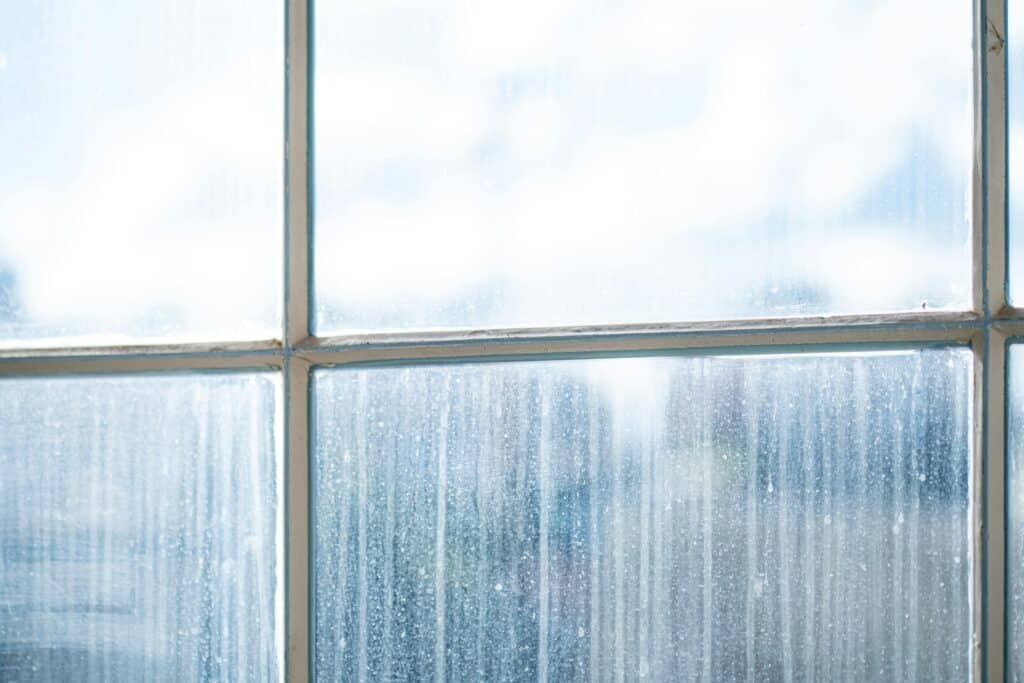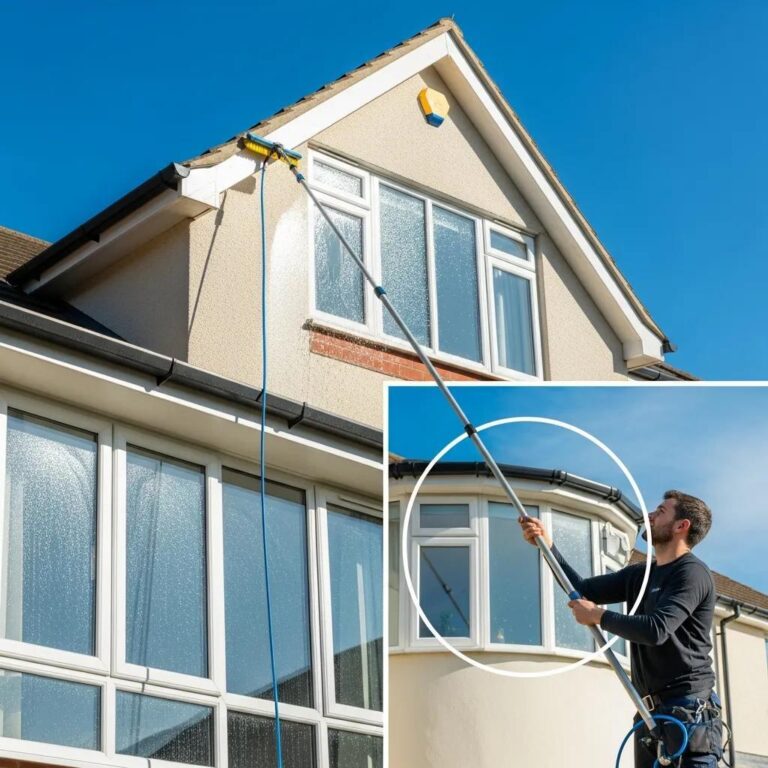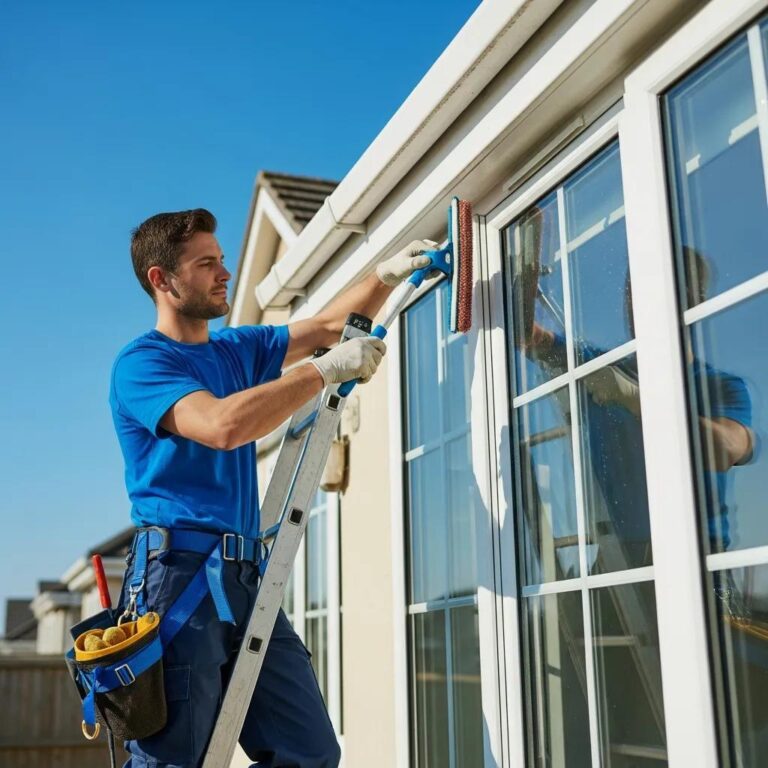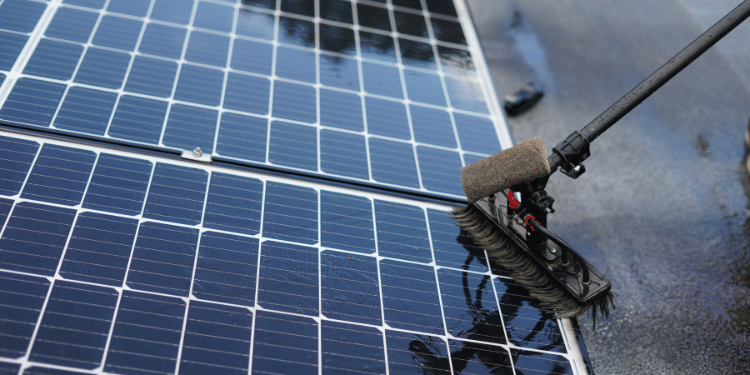When was the last time you cleaned your windows properly?
It’s easy to forget about them when you’re busy with life or work, but windows are the silent storytellers of a building.
They reflect how much care you give to your space. Whether at home or business, clean windows let in more natural light, improve curb appeal, and make everything feel fresher.
But how often should you clean them?
Too often, you might be wasting time and money. Not often enough, and they become dull, streaked, and even damaged over time.
In this blog post, we’ll break down the factors that determine your ideal cleaning schedule, look at differences between residential and commercial window care, highlight mistakes to avoid, and explain why hiring a professional could save you both effort and long-term costs.

7 Key Takeaways
- Window cleaning frequency depends on the environment, location, and building type
- Interior and exterior window cleaning schedules can differ
- Cleaning windows in direct sunlight can lead to streaks and a less-than-perfect finish
- Using the right tools and cleaning solutions is important to avoid damaging your window surfaces and frames
- Regular cleaning preserves the glass quality and window frames
- Also, consistent cleaning prevents the buildup of stubborn grime that can be harder to remove over time
- While DIY cleaning is possible, professional services offer expertise, specialized equipment, and safer access to hard-to-reach windows
Factors That Influence Window Cleaning Frequency
Several key factors influence how often you need to clean your windows, and they include:
1. Location and Environment
Cities are often characterized by higher levels of air pollution, including dust, smog, and particulate matter. This airborne grime can quickly accumulate on window surfaces, leading to a noticeable decrease in clarity. Buildings located near busy roads will also experience more dirt and exhaust residue.
In coastal regions, salt spray from the ocean can be corrosive and leave a persistent film on windows. Homes and businesses near the coast may need more frequent cleaning to prevent damage and maintain clear views. The humid air can also trap pollutants on the glass.
While rural areas are generally cleaner than urban environments, they can still present challenges. Farms can generate dust and agricultural runoff, while proximity to unpaved roads can lead to increased dirt accumulation. Pollen during certain seasons can also heavily coat windows.
If your property is near ongoing construction, you can expect a significant increase in dust and debris. Frequent cleaning will be necessary to combat this. In addition, factories and industrial sites can release various pollutants into the air, which can deposit on windows and be difficult to remove.
2. Weather Conditions
Harsh weather can significantly impact window cleanliness. While rain might seem like a natural window cleaner, it often carries dust and pollutants that can leave streaks and water spots when it evaporates. Heavy storms can also splatter mud and debris onto lower-level windows.
Windy conditions can carry dust, dirt, and leaves that accumulate on window surfaces. Also, different seasons bring different challenges. Spring can bring pollen and tree sap; summer might see more insects and dust. Autumn brings falling leaves and potential mildew, while winter can lead to salt residue from roads and general grime buildup.
3. Type of Property
The purpose and appearance of your property will also play a role in how often you clean your windows. Homeowners typically prioritize clean windows for aesthetic appeal and to enjoy natural light and unobstructed views. The frequency might depend on personal preference and the factors mentioned above.
For businesses, clean windows are often important for maintaining a professional image and attracting customers. First impressions matter, and dirty windows can convey a sense of neglect. Customer-facing businesses, such as retail stores, restaurants, and hotels, often require more frequent cleaning.
In office buildings, clean windows can improve the working environment by maximizing natural light, which has been linked to increased productivity and employee well-being. In hospitals and clinics, cleanliness is paramount. This likely extends to window maintenance to maintain a hygienic and pleasant environment for patients and staff.
How Often Should I Clean My Residential Windows?
For most homeowners, the general recommendation is twice a year; once in the spring and once in the autumn. Even if you don’t notice dirt at first, a light layer of grime can still block natural light and affect indoor brightness.
This schedule helps clear away winter grime and prepare for the sunny months when you want maximum light inside. However, some situations call for more frequent cleaning:
- Near the coast: Every 2–3 months to prevent salt buildup
- Busy urban areas: Every 2–4 months due to pollution and dust
- After storms: Rain mixed with dirt leaves spots and streaks that can stain glass if left too long
- Homes with children or pets: Fingerprints, smudges, and paw prints may require spot cleaning in between professional sessions
How Often Should Commercial Windows Be Cleaned?
Business properties have different standards, and clean windows directly impact customer perception. A spotless storefront says “professional, welcoming, and detail-oriented.” A dirty one? Not so much.
Recommended commercial cleaning frequencies are:
- Office buildings: Every 1–2 months for ground-level windows; high-rise glass walls may be cleaned every quarter
- Retail shops & restaurants: Weekly or bi-weekly, depending on foot traffic and weather
- Hotels: Often weekly for the lobby and entrance areas, monthly or quarterly for higher floors
- Healthcare facilities: At least monthly for hygiene and visibility
7 Common Window Cleaning Mistakes to Avoid
Whether you clean your windows yourself or hire someone, these are the most common errors you should be aware of to achieve the best result:
1. Cleaning in Direct Sunlight: This causes the cleaning solution to dry too quickly, leaving streaks and water spots. Choose a cloudy day or clean early in the morning or late in the afternoon.
2. Using the Wrong Cleaning Solutions: Harsh chemicals can damage window seals and frames. Use mild dish soap and water or specialized window cleaning solutions. And you should avoid abrasive cleaners.
3. Over-Saturating the Window: Applying too much cleaning solution can lead to drips and streaks. Use a light, even spray.
4. Forgetting to Clean the Frames and Sills: These areas often accumulate dirt and can contaminate your freshly cleaned glass. Wipe them down before cleaning the window itself.
5. Not Using a Squeegee Properly: If using a squeegee, overlap each stroke by about an inch and wipe the blade clean after each pass. Use a clean, lint-free cloth to wipe the edges.
6. Using Paper Towels: Paper towels can leave lint on your windows. Microfiber cloths are a better choice.
7. Ignoring Safety Precautions: When cleaning high or hard-to-reach windows, always use a sturdy ladder and have someone spot you. Consider hiring a professional for safety reasons.
The Benefits of Hiring a Professional for Your Window Cleaning
Cleaning your windows might sound simple, but professional cleaning offers advantages you can’t get from a DIY job:
- Better results: Professionals use purified water systems, commercial-grade squeegees, and techniques that leave no streaks or residue
- Time savings: No need to spend your weekend wrestling with ladders and buckets
- Safety: Experienced cleaners handle high or hard-to-reach windows without risk to you
- Extended window life: Regular, thorough cleaning prevents scratches, etching, and frame damage
When it comes to professional services, Clear View Services stands out as the go-to choice, as you get years of expertise, eco-friendly cleaning solutions, and advanced equipment for every job.
Whether you need your home windows brightened up or your business façade sparkling, you get a flawless finish that lasts longer.
Conclusion
How often you clean your windows depends on your environment, building type, and personal standards, but one thing is certain: consistent maintenance pays off.
By understanding the factors that influence your cleaning and being aware of common cleaning mistakes, you can make informed decisions about your window maintenance schedule.
Whether you choose the DIY approach or opt for the expertise and convenience of professional window cleaners, regular attention to your windows will ensure a brighter, clearer view and a more appealing property.
For homeowners, twice a year is the baseline, with more frequent cleaning if you live in dusty, coastal, or high-traffic areas.
For businesses, the schedule is often monthly, weekly, or even more frequently to maintain a professional appearance.
Instead of struggling with ladders, streaks, and spending hours, let the experts handle it for you. ClearView Services offers dependable, high-quality window cleaning service in Maidstone that saves you time and guarantees crystal-clear results.
You get trained professionals who know how to make your windows sparkle inside and out while protecting your glass for years to come to do the job for you. Call ClearView Services today to schedule your next window cleaning services and see the difference for yourself.




